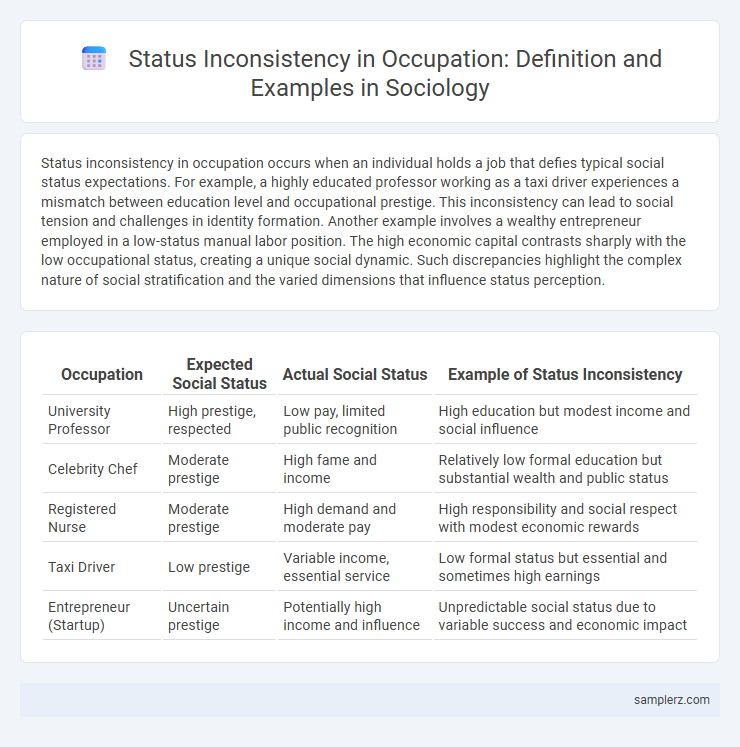Status inconsistency in occupation occurs when an individual holds a job that defies typical social status expectations. For example, a highly educated professor working as a taxi driver experiences a mismatch between education level and occupational prestige. This inconsistency can lead to social tension and challenges in identity formation. Another example involves a wealthy entrepreneur employed in a low-status manual labor position. The high economic capital contrasts sharply with the low occupational status, creating a unique social dynamic. Such discrepancies highlight the complex nature of social stratification and the varied dimensions that influence status perception.
Table of Comparison
| Occupation | Expected Social Status | Actual Social Status | Example of Status Inconsistency |
|---|---|---|---|
| University Professor | High prestige, respected | Low pay, limited public recognition | High education but modest income and social influence |
| Celebrity Chef | Moderate prestige | High fame and income | Relatively low formal education but substantial wealth and public status |
| Registered Nurse | Moderate prestige | High demand and moderate pay | High responsibility and social respect with modest economic rewards |
| Taxi Driver | Low prestige | Variable income, essential service | Low formal status but essential and sometimes high earnings |
| Entrepreneur (Startup) | Uncertain prestige | Potentially high income and influence | Unpredictable social status due to variable success and economic impact |
Understanding Status Inconsistency in Social Occupations
Status inconsistency in social occupations occurs when individuals hold positions with conflicting levels of prestige, income, or authority, such as a university professor earning less than a corporate manager despite higher education. This mismatch can affect social identity and workplace dynamics, leading to feelings of dissatisfaction or perceived unfairness. Understanding the nuances of status inconsistency helps explain disparities in social stratification and occupational hierarchy.
Teachers: High Respect, Moderate Pay
Teachers experience status inconsistency as they receive high societal respect for their role in education, yet often earn moderate or below-average salaries compared to other professions with similar social esteem. This disparity highlights the gap between the symbolic value assigned to teaching and the economic rewards teachers receive. Such occupational status inconsistency affects job satisfaction, recruitment, and retention in the education sector.
Police Officers: Authority with Varied Societal Perceptions
Police officers hold formal authority and enforce laws, yet their social status varies across communities due to perceptions shaped by factors such as race, gender, and local crime rates. This occupation exemplifies status inconsistency, as officers possess high institutional power but may experience low social prestige in areas with strained police-community relations. Conflicting societal views create tension between their official role and public recognition, highlighting the complexity of status inconsistency in law enforcement.
Nurses: Critical Roles, Limited Professional Prestige
Nurses play a vital role in healthcare by providing essential patient care and supporting medical teams, yet they often face limited professional prestige compared to physicians despite their critical responsibilities. This status inconsistency reflects the social undervaluation of nursing despite its complexity and emotional labor. The disparity between nurses' occupational importance and societal recognition highlights ongoing challenges in occupational status hierarchy.
Artists: Cultural Influence vs. Economic Instability
Artists often experience status inconsistency due to their high cultural influence contrasted with economic instability. Despite shaping societal values and trends, many artists face irregular income and lack of financial security. This disparity highlights the tension between symbolic capital and economic capital within the creative professions.
Skilled Trades Workers: Essential Skills, Underappreciated Status
Skilled trades workers possess essential technical expertise and hands-on experience critical to infrastructure and daily operations yet often face underappreciated social status compared to professionals in fields like finance or technology. Despite high demand and stable job security, their occupational prestige remains lower due to societal perceptions undervaluing manual labor and skilled craftsmanship. This status inconsistency highlights a disconnect between the economic importance of skilled trades and their social recognition.
Social Workers: Community Impact, Low Social Standing
Social workers often experience status inconsistency, as their critical community impact contrasts sharply with their low social standing and limited economic rewards. While they address essential social issues such as mental health, child welfare, and poverty alleviation, their occupations are frequently undervalued in terms of prestige and compensation. This disparity highlights the disconnect between societal contributions and occupational status, affecting recruitment and retention within social work professions.
Journalists: Public Visibility, Contentious Social Trust
Journalists often experience status inconsistency due to their high public visibility contrasted with varying levels of social trust. While their occupation grants them media influence and access to information, public skepticism and accusations of bias can diminish their social esteem. This discrepancy illustrates how professional prestige does not always align with societal approval in the realm of journalism.
Academic Researchers: Intellectual Prestige, Financial Uncertainty
Academic researchers often experience status inconsistency by holding high intellectual prestige within the scholarly community while facing financial uncertainty and comparatively modest salaries. Their contributions to knowledge and innovation garner respect, yet limited funding and job insecurity create a mismatch between occupational esteem and economic rewards. This disparity highlights the complex social dynamics of occupational status where intellectual recognition does not always translate to financial stability.
Politicians: Influential Power, Polarized Public Esteem
Politicians often experience status inconsistency when their influential power contrasts sharply with polarized public esteem, as their high authority may coexist with widespread public mistrust or disapproval. This discrepancy illustrates how occupational prestige does not always align with social approval, affecting politicians' social interactions and legitimacy. Such inconsistency is evident in cases where elected officials wield significant decision-making power yet face fluctuating approval ratings or public protests.

example of status inconsistency in occupation Infographic
 samplerz.com
samplerz.com